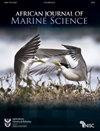A natural terminal Pleistocene decline of African penguin populations enhances their anthropogenic extinction risk
IF 1.4
4区 生物学
Q3 MARINE & FRESHWATER BIOLOGY
引用次数: 0
Abstract
The African penguin Spheniscus demersus, endemic to the coast of southern Africa, has suffered anthropogenic-driven population declines since 1900 and is now listed as Endangered on the IUCN Red List. Conservation efforts currently underway are informed by the species’ adaptive response with respect to colonisation capacity and breeding success, vulnerability because of anthropogenic competition for prey species, and global climate change. Here, we show how the available nesting habitat of African penguins likely declined precipitously post the Last Glacial Maximum, driven by island inundation as sea levels rose naturally, before anthropogenic global warming. The average size and numbers of islands around the southern African coast decreased almost tenfold between ∼15 kya and the mid Holocene (∼7 kya). In addition, the geographic distribution of islands shifted predominantly away from the South African west to the south and east coasts. The natural decline of island habitat likely caused a decline in the penguin population, which is likely relevant in current assessments of the vulnerability of this species to novel anthropogenic drivers of population decline. The status of the African penguin as a post-Pleistocene refugial species has amplified its extinction risk due to anthropogenic impacts, despite natural resilience to paleoclimatic change afforded by an apparent capacity for habitat colonisation and evident persistence through late-Pleistocene bottlenecks.更新世末期非洲企鹅数量的自然下降增加了它们的人为灭绝风险
非洲企鹅Spheniscus demersus是非洲南部海岸的特有物种,自1900年以来,由于人类活动导致企鹅数量下降,现已被世界自然保护联盟列为濒危物种红色名录。目前正在进行的保护工作是根据物种在殖民化能力和繁殖成功方面的适应性反应,由于人为竞争猎物物种而造成的脆弱性以及全球气候变化而进行的。在这里,我们展示了在人为的全球变暖之前,由于海平面自然上升,岛屿被淹没,非洲企鹅的可用筑巢栖息地可能在末次冰盛期后急剧减少。在~ 15 kya至全新世中期(~ 7 kya)期间,南部非洲海岸周围岛屿的平均大小和数量减少了近10倍。此外,岛屿的地理分布主要从南非西部转移到南部和东部海岸。岛屿栖息地的自然减少可能导致企鹅数量的减少,这可能与当前评估该物种对人口减少的新人为驱动因素的脆弱性有关。非洲企鹅作为一种后更新世的避难物种,尽管具有明显的栖息地殖民化能力和明显的跨越晚更新世瓶颈的持久性,但由于人为影响,非洲企鹅的灭绝风险已经扩大。
本文章由计算机程序翻译,如有差异,请以英文原文为准。
求助全文
约1分钟内获得全文
求助全文
来源期刊

African Journal of Marine Science
生物-海洋与淡水生物学
CiteScore
2.60
自引率
16.70%
发文量
17
审稿时长
6-12 weeks
期刊介绍:
The African (formerly South African) Journal of Marine Science provides an international forum for the publication of original scientific contributions or critical reviews, involving oceanic, shelf or estuarine waters, inclusive of oceanography, studies of organisms and their habitats, and aquaculture. Papers on the conservation and management of living resources, relevant social science and governance, or new techniques, are all welcomed, as are those that integrate different disciplines. Priority will be given to rigorous, question-driven research, rather than descriptive research. Contributions from African waters, including the Southern Ocean, are particularly encouraged, although not to the exclusion of those from elsewhere that have relevance to the African context. Submissions may take the form of a paper or a short communication. The journal aims to achieve a balanced representation of subject areas but also publishes proceedings of symposia in dedicated issues, as well as guest-edited suites on thematic topics in regular issues.
 求助内容:
求助内容: 应助结果提醒方式:
应助结果提醒方式:


